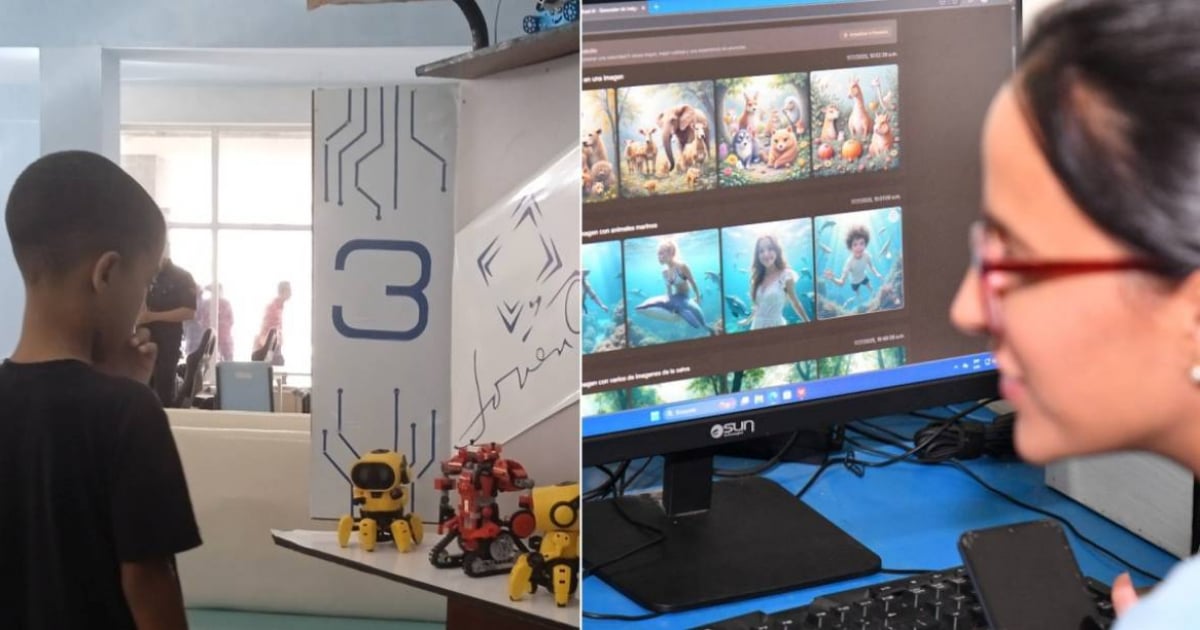
Artificial intelligence in Cuba? The regime promotes a workshop in Havana with support from the UN and UNESCO
The Cuban regime celebrated this week in Havana the fair “Inspiring Action”, an event on artificial intelligence (AI) featuring personalized training aimed at young people and organized with the support of the United Nations System, UNESCO, and several state institutions, including the Joven Club de Computación.
This type of initiative, carefully crafted for official propaganda and supported by international organizations, contrasts deeply with the reality faced by most Cuban children and youth, who not only lack access to personal computers but also endure daily power outages, connectivity issues, and poor conditions in their schools.
The event, held at the Central Computing Palace, included exhibitions of technological projects from both the state and non-state sectors, as well as forums for sharing experiences among entities that have implemented AI tools in the country.
According to its organizers, the goal was to promote the responsible, ethical, and critical use of these emerging technologies, especially among the younger generations.
A workshop in Havana: What about the rest of the country?
The fair was promoted as a tool to empower Cuban youth with digital skills, but the reality is that only a very small segment of the youth population, particularly from the capital, had access to the event. No information has been provided about similar activities in the provinces, where the deterioration of technological and educational infrastructure is even more evident.
Most Cuban households do not have computers, and in educational centers, access to the Internet is limited, unstable, or non-existent. On top of this, there is the daily power outage, which makes it impossible for real and sustained development of digital skills among Cuban children and teenagers.
An empty speech in the face of a critical reality
The event is part of the celebrations for the 80th anniversary of the United Nations and the World Youth Skills Day, focusing this year on artificial intelligence.
The initiative also references UNESCO’s recommendations on the ethical use of AI, in an effort to align the Cuban regime with international best practices in technology.
The artificial intelligence fair represents yet another example of the double talk of the Cuban government, which tries to project an image of digital advancement while keeping the majority of its population excluded from real access to technology, trapped between censorship, resource scarcity, and the structural inefficiency of the system.
While the news discusses Cuban youth learning programming languages and debating algorithmic biases, in the neighborhoods of Cuba, the everyday reality is the lack of electricity, the impossibility of internet access, and the absence of basic devices for learning in the 21st century.
Once again, the regime showcases a facade of modernity, but the reality of the country continues to experience a significant technological and educational decline.
Frequently Asked Questions about Artificial Intelligence in Cuba
What is the “Inspiring Action” event in Havana?
“Inspiring Action” is an artificial intelligence fair held in Havana, aimed at young people and supported by the UN, UNESCO, and Cuban state agencies. This event included exhibitions of technological projects and personalized training, highlighting the responsible use of AI. However, the reality is that only a small segment of Cuban youth had access to the event, reflecting the technological inequalities in the country.
How does the artificial intelligence event contrast with the Cuban reality?
The artificial intelligence event in Cuba contrasts with the reality of most Cubans, who face daily blackouts, lack access to computers and the internet, and experience poor conditions in schools. While the government projects an image of digital modernity, the majority of the population is excluded from real access to technology, reflecting the Cuban regime’s double discourse.
What role do international organizations play in the development of AI in Cuba?
The UN and UNESCO support events like “Inspiring Action”, which promote the use of artificial intelligence in Cuba. However, this support occurs while the majority of Cubans lack access to basic technologies, raising criticisms about the effectiveness of such initiatives in a country with serious technological shortcomings.
How does the lack of technological infrastructure affect the development of AI in Cuba?
The lack of technological infrastructure in Cuba seriously hinders the development of artificial intelligence. Internet access is limited, unstable, or non-existent in many areas, and most households lack computers. Additionally, daily power outages complicate the advancement of digital skills, which prevents a real and sustained development of AI in the country.

